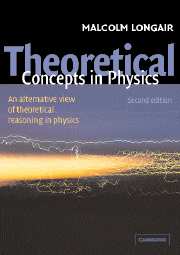Book contents
- Frontmatter
- Contents
- Preface and acknowledgements
- 1 Introduction
- Case Study I The origins of Newton's laws of motion and of gravity
- Case Study II Maxwell's equations
- Case Study III Mechanics and dynamics – linear and non-linear
- Case Study IV Thermodynamics and statistical physics
- Case Study V The origins of the concept of quanta
- 11 Black-body radiation up to 1895
- 12 1895–1900: Planck and the spectrum of black-body radiation
- 13 Planck's theory of black-body radiation
- 14 Einstein and the quantisation of light
- 15 The triumph of the quantum hypothesis
- Case Study VI Special relativity
- Case Study VII General relativity and cosmology
- Index
15 - The triumph of the quantum hypothesis
Published online by Cambridge University Press: 05 June 2012
- Frontmatter
- Contents
- Preface and acknowledgements
- 1 Introduction
- Case Study I The origins of Newton's laws of motion and of gravity
- Case Study II Maxwell's equations
- Case Study III Mechanics and dynamics – linear and non-linear
- Case Study IV Thermodynamics and statistical physics
- Case Study V The origins of the concept of quanta
- 11 Black-body radiation up to 1895
- 12 1895–1900: Planck and the spectrum of black-body radiation
- 13 Planck's theory of black-body radiation
- 14 Einstein and the quantisation of light
- 15 The triumph of the quantum hypothesis
- Case Study VI Special relativity
- Case Study VII General relativity and cosmology
- Index
Summary
The situation in 1909
In no sense were Einstein's startling new ideas on light quanta immediately accepted by the scientific community at large. Most of the major figures in physics rejected the idea that light could be considered to be made up of discrete quanta. In a letter to Einstein in 1907, Planck wrote:
I look for the significance of the elementary quantum of action (light quantum) not in vacuo but rather at points of absorption and emission and assume that processes in vacuo are accurately described by Maxwell's equations. At least, I do not yet find a compelling reason for giving up this assumption which for the time being seems to be the simplest.
Planck continued to reject the light-quantum hypothesis as late as 1913. In 1909, Lorentz, who was generally regarded as the leading theoretical physicist in Europe and whom Einstein held in the highest esteem, wrote:
While I no longer doubt that the correct radiation formula can only be reached by way of Planck's hypothesis of energy elements, I consider it highly unlikely that these energy elements should be considered as light quanta which maintain their identity during propagation.
Einstein never deviated from his conviction concerning the reality of quanta and continued to find other ways in which the experimental features of black-body radiation would lead inevitably to the conclusion that light consists of quanta. In one of his most beautiful papers, written in 1909, he showed how fluctuations in the intensity of the black-body radiation spectrum provide further evidence on the quantum nature of light.
- Type
- Chapter
- Information
- Theoretical Concepts in PhysicsAn Alternative View of Theoretical Reasoning in Physics, pp. 366 - 396Publisher: Cambridge University PressPrint publication year: 2003

